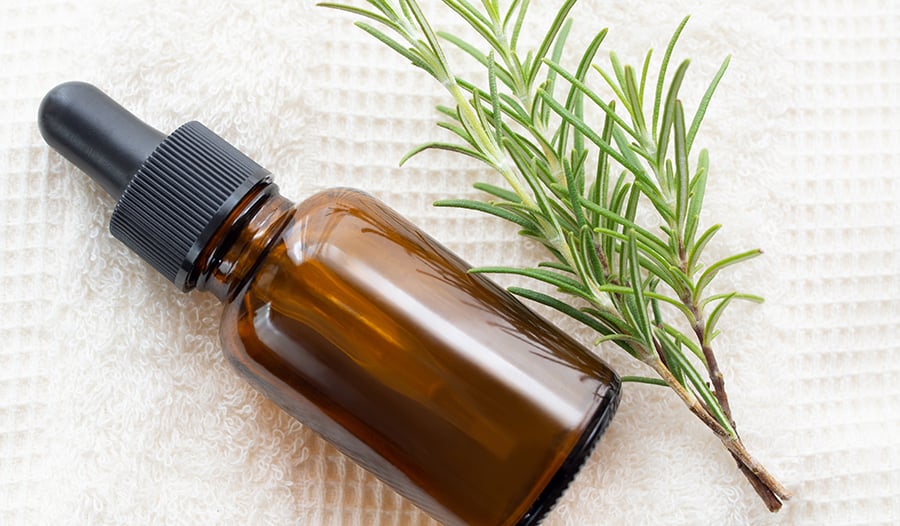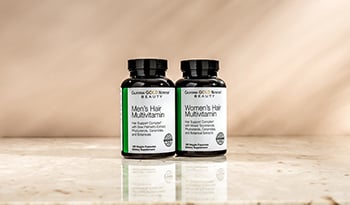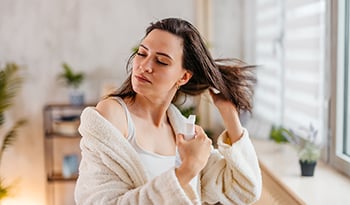Rosemary Oil Benefits: The Secret to Healthier, Thicker Hair

Hair health can be influenced by many different factors. Genetics, hormones, lifestyle, eating habits, and your environment are some of the primary elements that determine the health of your hair. Throughout life, you may notice your hair health change. In some phases, your hair may become drier and coarse. Other times, you may lose more hair than you would like. And on occasion, you have the soft, silky hair you love.
Among many common hair-related complaints, thinning and hair loss are two of the top concerns for adults. Prescription medications, over-the-counter products, and surgeries are available to solve these issues—but many come with unwanted side effects. The downtime and risk associated with surgery, increased body hair growth, and scalp irritation are just some of the side effects of common prescription and over-the-counter hair loss products. While these may not be life-threatening, they can be uncomfortable and negatively impact your quality of life.
Luckily, several natural products may help promote hair growth and prevent hair loss with fewer side effects. In particular, rosemary oil has gained a lot of interest in recent years for its ability to promote hair health. Read on to learn more about rosemary oil, its uses in promoting hair growth and slowing hair loss, and how to modify your diet to encourage better hair health.
Rosemary Oil Benefits and Uses
Rosemary oil is most known as a flavorful culinary herb, but it has also been used for centuries in medicinal applications. It is said to offer antioxidant and anti-inflammatory benefits and may help improve memory and concentration.1 Some animal research even suggests rosemary extract may help prevent breast and colon cancers.2 With powerful health properties, you are sure to hear more about rosemary oil and related products in years to come.
1. Aromatherapy
Rosemary essential oil is commonly used in aromatherapy. Not only does rosemary oil have a comforting, earthy scent, but it is thought to relieve stress and may improve concentration and memory.
Whether diffused on its own or with other oils known for their stress-reducing benefits, like lavender, inhaling the scent of rosemary throughout the day may help improve your cortisol levels. To reap these benefits, consider adding a diffuser to your office and home, and check out the wide variety of essential oils available. While some may help improve sleep, others energize—and you may choose some simply because you enjoy the scent.
2. Improved Circulation
When it comes to rosemary oil’s hair health benefits, this oil may promote hair growth in several ways. One suspected method of action is through improved circulation, which can increase blood flow to hair follicles.3 When blood circulation is poor, lack of blood flow to hair follicles may result in them dying off, leading to hair loss. The natural anti-inflammatory properties of rosemary may also support hair health.
3. Hair Health Benefits
The research on rosemary oil’s effect on hair health is promising. In one study examining the efficacy of rosemary oil for treating male or female pattern baldness, people who used rosemary oil for six months experienced similar significant increases in hair growth as those who used minoxidil 2%, commonly known as Rogaine. Additionally, scalp itching was significantly less frequent in those using rosemary essential oil compared to those using minoxidil 2%, adding another benefit to using rosemary over commercial products manufactured for hair loss.4
Another study examined the use of essential oils for alopecia, a condition characterized by sudden, patchy hair loss. In it, people with alopecia who massaged a combination of oils including thyme, rosemary, lavender, and cedarwood into their scalps daily had significantly more hair growth than individuals who used only a carrier oil.5
How Do You Use Rosemary Oil for Hair?
If you are considering using rosemary oil to help with hair loss, here are a few methods for incorporating this oil into your wellness routine.
- Massage oil into your scalp: Try simply massaging your scalp with rosemary and other oils thought to benefit hair growth. Combine roughly five drops of rosemary oil with one to two teaspoons of a carrier oil, like jojoba or sweet almond oil, and thoroughly massage into your scalp. If you choose to rinse your hair following the oil application, allow the oil to penetrate your scalp for 5 to 10 minutes before rinsing. Otherwise, you can wait until your next shower to rinse out the oil.
- Add rosemary oil to your hair products: Consider adding rosemary oil to your regular hair products, including shampoo, conditioner, and serums. Start small with products like hair serums that sit on your scalp for hours. For shampoo and conditioner that get washed out quickly after application, consider adding about five drops of rosemary oil per ounce of product.
Rosemary Oil Safety
Avoid getting rosemary oil directly in your eyes. Luckily, no known health concerns or side effects are associated with using rosemary oil in aromatherapy or topical applications. The best approach is to start small, mix essential oil with a carrier oil before applying it to your skin, and slowly increase the amount of rosemary oil you use until you determine your skin’s tolerance.
Top Foods for Healthier Hair
Rosemary oil’s beneficial effects on hair growth and overall hair health are promising. But if you’re concerned about hair loss, eating more foods rich in nutrients that support hair health may further support your journey to soft, silky hair.
Not getting enough of certain nutrients could slow hair growth and may even contribute to hair loss. Deficiencies in vitamins D and B12, biotin, riboflavin, and iron are just some of the nutrients thought to play a role in hair loss.6 Taking a daily hair, skin, and nail supplement can help ensure you get adequate amounts of vitamins and minerals important for hair health. An overall balanced diet rich in a wide variety of micronutrients may also support hair health.
The following foods are particularly rich in nutrients that support hair health.
Fatty Fish
Fatty fish, including salmon, herring, and mackerel, contain heart-healthy omega-3 fats linked to hair growth.7 In one study, women who supplemented with omega-3 and omega-6 fatty acids along with antioxidants for six months experienced reduced hair loss and more, thicker hair growth compared to a control group.8 While a supplement provides a more concentrated source of omega-3s, you can also get ample amounts from eating fatty fish.
Fatty fish is also an excellent source of protein and vitamin D3, another micronutrient important for healthy hair. Vitamin D deficiency has been linked to hair loss.9 Canned fish is an easy, convenient option for incorporating more fatty fish into your diet. Simply add canned fish to salads or sandwiches, or eat it on its own with your favorite crackers.
Nuts and Seeds
Across the board, nuts and seeds are excellent sources of healthy fats, fiber, and protein. Some are even known for their omega-3 content, like walnuts and chia, flax, and hemp seeds. They also provide micronutrients important to hair health, like vitamin E, B vitamins, and zinc.
Incorporate more nuts and seeds into your daily menu to nurture healthy hair. All nuts and seeds make great toppings to oatmeal and smoothies, and whole nuts are a simple snack option that can be combined with dried fruit for a sweet and salty treat. Don’t forget nut and seed butters, which are another easy, versatile way to incorporate hair-healthy nutrients into your everyday meals and snacks.
Oysters
While perhaps not the most versatile food on this list, oysters may also contribute to your hair health. Oysters are exceptionally high in zinc, a nutrient necessary for hair and skin health. In fact, zinc deficiency may lead to hair loss, according to one study.10 Zinc supplements appear to reverse hair loss caused by deficiency, and daily consumption of high-zinc foods can help maintain healthy blood levels of this nutrient.11
Enjoy fresh oysters from local restaurants. For a simple solution to your oyster craving, incorporate canned oysters into your homemade pasta dishes, use them to top your pizza, or make a batch of seafood stew.
Beans
Like oysters, beans are another concentrated source of dietary zinc and other hair-health nutrients like biotin and iron. Beans are incredibly versatile and can be enjoyed hot or cold in salads or soups, roasted and seasoned, or mashed into homemade hummus. You’ll also find other essential nutrients in beans, like fiber and protein, both of which should be part of every meal you eat.
Don’t forget about soybeans when considering ways to boost your intake of essential nutrients. Steamed or dry-roasted edamame is an easy protein-rich snack or meal topping that requires minimal preparation.
Meat
Known for its protein content, red meat is also high in bioavailable iron. Iron helps your red blood cells deliver oxygen throughout your body, including to hair follicles. Choose lean cuts of meats that contain less saturated fat and cholesterol than fattier cuts. For an easy way to incorporate this protein and iron-rich food into your snacks, try beef jerky. Pair with a serving of fruit for a well-balanced snack.
Takeaway
Rosemary doesn’t just add flavor to your food and a calming aroma to your environment—research suggests using rosemary oil topically may help support healthy hair growth and slow hair loss with fewer side effects than commercial products for hair loss. A well-balanced diet rich in nutrients like vitamin D, B vitamins, omega-3s, zinc, and iron can also support hair health and lower the risk of hair loss due to nutrient deficiencies.
While there are no known side effects to using rosemary for culinary purposes, aromatherapy, or hair loss, always use a carrier oil before applying rosemary oil directly to your skin or scalp.
References:
- Veenstra JP, Johnson JJ. Rosemary (Salvia rosmarinus): Health-promoting benefits and food preservative properties. Int J Nutr. 2021;6(4):1-10.
- Moore J, Yousef M, Tsiani E. Anticancer Effects of Rosemary (Rosmarinus officinalis L.) Extract and Rosemary Extract Polyphenols. Nutrients. 2016;8(11).
- Ahmed HM, Babakir-Mina M. Investigation of rosemary herbal extracts (Rosmarinus officinalis) and their potential effects on immunity. Phytotherapy Research. 2020;34(8):1829-1837.
- Panahi Y, Taghizadeh M, Marzony ET, Sahebkar A. Rosemary oil vs minoxidil 2% for the treatment of androgenetic alopecia: a randomized comparative trial. Skinmed. 2015;13(1):15-21.
- Harries MJ, Sun J, Paus R, King LE. CLINICAL REVIEW Management of alopecia areata. BMJ. 2010;341:3671.
- Almohanna HM, Ahmed AA, Tsatalis JP, Tosti A. The Role of Vitamins and Minerals in Hair Loss: A Review. Dermatol Ther (Heidelb). 2019;9(1):51.
- Fish, salmon, pink, canned, total can contents. FoodData Central. Accessed August 24, 2023.
- Le Floc’h C, Cheniti A, Connétable S, Piccardi N, Vincenzi C, Tosti A. Effect of a nutritional supplement on hair loss in women. J Cosmet Dermatol. 2015;14(1):76-82.
- Nayak K, Garg A, Mithra P, Manjrekar P. Serum Vitamin D3 Levels and Diffuse Hair Fall among the Student Population in South India: A Case-Control Study. Int J Trichology. 2016;8(4):160-164.
- Cheung EJ, Sink JR, English Iii JC. Vitamin and Mineral Deficiencies in Patients With Telogen Effluvium: A Retrospective Cross-Sectional Study. J Drugs Dermatol. 2016;15(10):1235-1237.
- Zinc - Health Professional Fact Sheet. National Institutes of Health. Accessed August 24, 2023.
DISCLAIMER:This Wellness Hub does not intend to provide diagnosis...
















































































 Table of Contents
Table of Contents
















